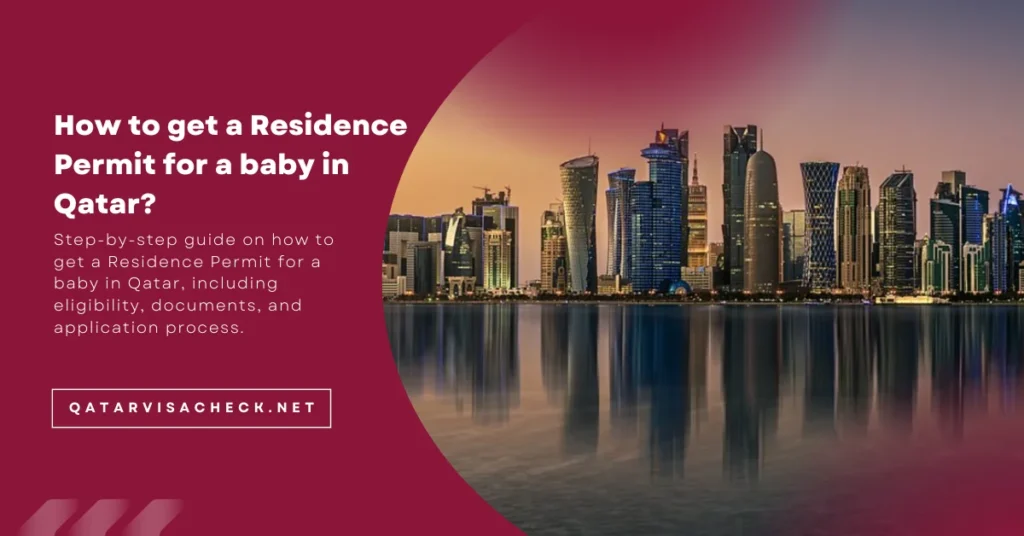Welcoming a new baby is a joyful experience, but for expatriates in Qatar, it also means navigating the Qatar visa process for your little one. Getting a Residence Permit (RP) for your baby is not optional—it’s a legal requirement that must be completed within specific timeframes to avoid penalties. This comprehensive guide breaks down the exact steps to obtain your baby’s residence permit in Qatar, with updated requirements for 2025.
Important Deadlines for Baby’s Residence Permit
The Qatar immigration rules require expatriate parents to apply for their baby’s residence visa within:
- Two months of birth (for babies born in Qatar)
- Two months after arrival (for babies born outside Qatar)
Failing to meet these deadlines results in a QR 10 per day penalty, which can quickly add up. The process involves several steps, beginning with obtaining the baby’s birth certificate and passport.
Registering Your Baby’s Birth
For Babies Born in Qatar
- Register the birth at the Ministry of Public Health (MOPH) and obtain a birth certificate.
- Register the birth with the parents’ home country embassy in Qatar.
- Apply for a passport for the baby through the embassy.
For Babies Born Outside Qatar
- Obtain a birth certificate from the country of birth.
- Have the birth certificate attested by the Qatar Embassy in the home country.
- Apply for the baby’s passport in the home country.
Obtaining Your Baby’s Passport
Once the birth certificate is issued, apply for the baby’s passport at the home country’s embassy in Qatar. Required documents typically include:
- Birth certificate
- Parents’ passports
- Marriage certificate
- Passport photos of the baby
- Applicable embassy fees
Required Documents for Residence Permit Application
For Babies Born in Qatar
- Parents’ Qatar Residence Permits (QIDs)
- Parents’ passports
- Marriage certificate (attested)
- Baby’s passport
- Birth certificate from the hospital
- Baby’s vaccination card
- Father’s employment verification letter (attested by the ministry)
- Father’s employer’s No Objection Certificate (NOC)
- Father’s attested employment contract
- Father’s attested education certificates
- Father’s 6-month bank salary statements (sealed and signed by the bank)
- Rental agreement attested by the Ministry of Municipality
- Utility bill showing the parents’ residence
- 4+ passport-sized photos of the baby (blue background)
For Babies Born Outside Qatar
- All documents listed above, plus:
- Attested birth certificate from the home country
- Attested vaccination card from the home country
Additional Documents for Mother-Sponsored Baby
- Mother’s employment contract
- Mother’s salary certificate
- NOC from father allowing the mother to sponsor the baby
Eligibility Criteria for Sponsoring a Baby
As of 2025, the salary requirement for expatriate parents sponsoring their baby is:
- QR 10,000 minimum salary (government or semi-government employees)
- QR 10,000 salary or QR 6,000 salary + employer-provided housing (private sector employees)
- Employment in a technical or specialized profession
- Accredited employment contract
- Mandatory health insurance
Step-by-Step Application Process for Baby’s Residence Permit
Step 1: Fill Out the Government Application Form
- Complete the Arabic government application form with accurate details.
Step 2: Submit Documents at the Immigration Office
- Take a queue token at the entrance.
- Present all required documents to the immigration officer.
- If documents are approved, receive a receipt with the visa application number.
Step 3: Check Visa Status
- Track the Qatar visa processing status through the Metrash2 app.
Step 4: Collect the Printed Residence Permit
- Once the status reads “Ready to Print”, visit the Immigration Office.
- Bring the original passport and visa receipt.
- Pay the QR 500 printing fee (card only) to receive the baby’s Qatar ID (QID).
Medical Examination for Babies
Babies under 15 years old do not require medical tests but must visit the Medical Commission to update their visa status.
Step 1: Visit the Medical Commission
- Go to the Medical Commission on Al-Muntazah Street during working hours.
Step 2: Bring Required Documents
- Original passport
- Copy of visa
- Two passport-sized photos
- QR 100 processing fee
Step 3: Complete Visa Status Update
- Submit the documents and complete any required formalities to update the baby’s visa record.
Fingerprinting Process for Residence Permit in Qatar
Step 1: Check if Fingerprinting is Required
- Children under 15 years old are exempt from fingerprinting.
Step 2: Visit the Fingerprinting Location
- If required, visit the Criminal Evidence and Investigation Department (CEID) on Salwa Road.
- Alternatively, visit an MOI service center where fingerprinting is available.
Step 3: Complete the Biometric Scanning
- Undergo the biometric scanning process if required by authorities.
Special Case: Newborn Visa for Babies Born Outside Qatar
For babies born abroad, parents can apply for a Newborn Visa at the Doha entry port if:
- One parent is a Qatar resident
- The baby is under six months old
- The baby has a separate passport and original birth certificate
This entry visa allows the baby to enter Qatar, after which you must apply for the regular residence permit.
Time Limits and Penalties for Qatar Baby Residence Permit
- Apply within two months of birth (if born in Qatar) or arrival (if born abroad).
- QR 10 per day penalty applies for delays beyond the deadline.
Residence Permit Renewal for Dependent Children
When it’s time to renew your child’s permit, note these requirements:
- Children aged 6-18 years require education registration with the Ministry of Education and Higher Education (MOEHE)
- Required documents include the child’s Qatar ID, passport copy, and enrollment letters from school
- Processing takes approximately 5-10 business days
Father’s vs. Mother’s Sponsorship: Key Differences
| Aspect | Father’s Sponsorship | Mother’s Sponsorship |
| Eligibility | Primary sponsor | Requires special approval |
| Salary Requirement | QR 10,000 minimum | Varies (often higher) |
| Processing Time | Faster | May take longer |
| Documentation | Standard set | Additional documents needed |
Common Challenges and Solutions
Delayed Birth Registration
If you’ve missed the initial registration window:
- Be prepared to pay the daily penalty fees
- Gather all required documents plus a letter explaining the delay
- Visit the Immigration Office in person rather than applying online
Document Attestation Issues
If your home country documents need attestation:
- Contact your embassy for guidance on the process
- Use authorized attestation services to expedite the process
- Allow extra time for this step, as it can take several weeks
Application Status Stuck on “Under Process”
If your application seems delayed:
- Wait at least two weeks before following up
- Check the Metrash app daily for updates
- For persistent delays, visit the Immigration Office in person
Final Steps and Recommendations
To ensure a smooth process and avoid penalties:
- Start the application process as early as possible
- Keep copies of all documents and application receipts
- Track the application status regularly via Metrash
- Ensure your own residence permit is valid throughout the process
- Register your baby’s National Address after obtaining their QID
Following these steps will help you successfully navigate the Qatar visa application process for your baby and ensure your family’s legal residence status is properly established.
Frequently Asked Questions
Can a mother sponsor her baby in Qatar?
Yes, but additional requirements apply, including a No Objection Certificate from the father and proof of sufficient income.
Do babies need a medical test for Qatar residence permit?
No, babies under 15 don’t need medical tests but must be registered at the Medical Commission for a QR 100 fee.
How much does a baby’s residence permit cost in Qatar?
The total cost is approximately QR 800 (QR 200 for visa + QR 100 for medical registration + QR 500 for QID).
Can a baby enter Qatar on a visit visa first?
Yes, babies can enter on a visit visa, which can be converted to a residence permit by paying a QR 500 conversion fee.
What happens if I miss the two-month deadline?
You’ll be charged a QR 10 per day penalty fee, and you may face difficulties with other government services until the situation is regularized.

Amir Amin is a blogger from Qatar. With a background in computer sciences, he founded “Qatar Visa Check” to provide essential information and support to expats navigating visa processes and settling in Qatar.

